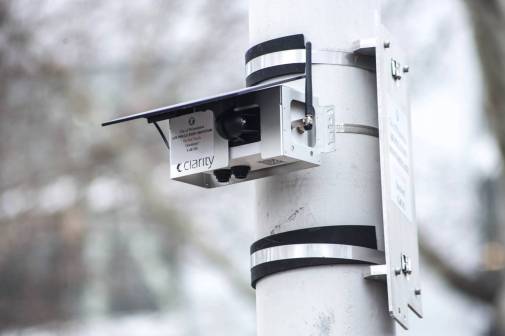Philadelphia names Mark Wheeler as permanent CIO
Once an employee of the city planning commission, then a geospatial data chief and deputy chief information officer, Mark Wheeler is now Philadelphia’s CIO.
Philadelphia Mayor Jim Kenney announced Monday that Wheeler, who had been serving as the city’s CIO in an interim capacity since Charles Brennan was fired in January , is now his permanent replacement. The city began a nationwide search upon Brennan’s departure and has been kept busy by a lawsuit filed by Brennan against the city in April citing “unlawful racial practices,” a complaint that the technology agency was hiring in preference of ethnic background rather than ability. That suit is still ongoing , but Wheeler, who has been serving the local government since first joining the city’s planning commission in 2010, turned out to be “the very best choice” for the job, said Kenney, a Democrat up for re-election next year.
“Mark brings tremendous leadership skills, a remarkable array of accomplishments that have brought innovation to our government, and a strong understanding of the solutions needed to fix and upgrade the back-office IT systems that drive our government,” Kenney said in a press release.
Wheeler draws on a deep background of data work, which he told StateScoop that he had hoped to deviate from when joining the planning commission, but kept returning to. When there was a challenge the city faced that could be approached with a technical solution, he said the project tended to gravitate to him. Eventually, he said then-CIO Adel Ebeid noticed this work and recruited him to serve as the city’s geographic information officer before he was promoted to the role of deputy CIO for enterprise data and architecture two years later.
Wheeler’s been credited with leading teams of analysts, project managers and developers while overseeing projects such as one to publish all of the city’s geographic information systems data to its open data portal, and another to create what the city says is its “first reliable” inventory of vacant buildings and lots.
He’s also gained a reputation as an active civic technologist, working outside of government as one of the co-founders of a 2015 pilot called the Neighbors Helping Neighbors Project , a series of workshops that generated the Citizens Toolkit , a guide of best practices and stories shared by locals telling how they instated constructive changes in their communities.
Wheeler said he first became interested in public service while studying environmental science as an undergraduate at Ferris State University in Michigan in the late 1980s. He remembered it as a time when the American public was becoming more interested in waste reduction and he and a group of students started the university’s first recycling program. He decided he wanted to do that work professionally and was soon introduced both to GIS, an essential tool for environmental scientists, and government.
But it wasn’t until joining the Cornell Cooperative Extension a few years later that Wheeler said the idea of public service really crystalized for him, and that he formed his first ideas of what it means to be innovative.
“It’s crazy that that work is actually where I learned about innovation strategies, because the best ideas were coming from people on the floor,” he said. “I mean the manufacturing floor — the janitor cleaning up things —because they were the ones that wanted to do the most amount of work in the least amount of time.”
Wheeler explained that it wasn’t that the janitors wanted to finish quickly so they could put their feet up, but rather that they were the ones who were the most intolerant of inefficiency because they were intimate with how things worked. He’s since carried that idea forward, advising organizations to listen to their floor workers on how to reduce waste, and later to grad school at the University of Massachusetts Amherst and then at Fountains America, now called F&W Forestry Services.
“I was managing application developers exclusively on spatial data projects and doing things on the web like getting regional planning and city planning agencies using web-based GIS and making it available for the public,” Wheeler said.
He said the Philadelphia’s chief administrative officer, Christine Derenick-Lopez, was the first to suggest to him that he take the role of interim CIO after Brennan left. Wheeler said “it was a shock but an honor.” After two months of the leading the IT organization for the nation’s fifth largest city, he had a change of heart.
“It actually felt like the right step after I got a chance to try it on,” Wheeler said.
The city continued its national search in the months to come, but ultimately settled on Wheeler.
Wheeler described his vision for Philadelphia’s IT agency as one that first does the fundamentals well, providing a high rate of availability for services, making the city’s systems highly secure and resilient and to delivering on projects consistently. He said he wants to build a reputation as a “highly trusted and highly valued” collaborative partner to other agencies.
“We are to many degrees, but there were years when we weren’t, and there are some bad memories that people get re-sensitized to if they’ve been here long enough,” Wheeler said. “So I do understand that and have to overcome that, as well.”
Another past shortcoming of the city’s IT approach has been what he called a “kitchen sink effect, where the technology just has to do everything, where in reality we can look at what we’re doing internally, tweak some things, make some changes so we do more with the technology instead of focusing on making it fit a manual process that maybe wasn’t very efficient anyway.”
Retooling the city’s processes, Wheeler said, will liberate staff from repetitive, low-impact tasks and ultimately lead to better services for residents. Like many CIOs, Wheeler favors the notion of a user-centric government experience. If an immigrant who wants to start a business approaches city government, for example, Wheeler said the goal is to provide a custom-tailored experience that takes into account all of unique challenges that individual may face while trying to be successful.
To make these things happen the city also needs to develop a strategy for recruiting and retaining IT agency staff who represent the city they are serving, Wheeler said. That’s a position that recalls what Brennan, in his lawsuit against the city, alleges led to his firing
“When people come here,” Wheeler said, “I want them to see people of color who are their colleagues and their managers and their directors and women and people from all stripes and sizes. And I think we have to work hard on making it clear there’s a real value to working with government and you don’t have to make it a lifetime commitment.”
This story was updated on Sept. 11, 2018 to reflect that Wheeler was an employee of the city planning commission, not an appointed commissioner.






